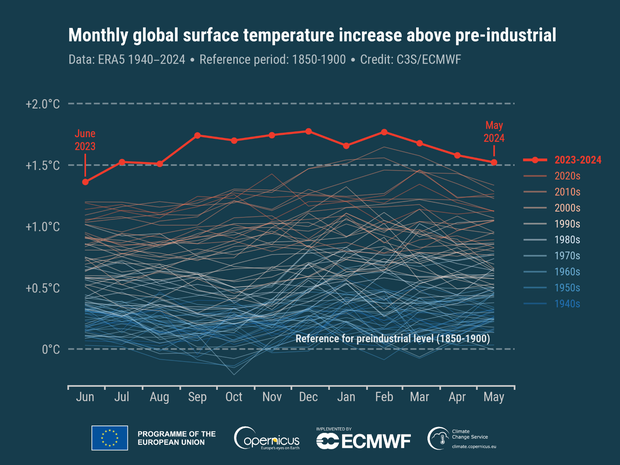In a concerning development, the world has experienced 12 consecutive months of record-breaking heat, according to various reports from international climate monitoring services. This unprecedented heatwave has led to numerous impacts around the globe, with countries experiencing unique stories due to climate change effects.
For instance, Ecuador had an average of 180 days of extreme heat above their local level during the past year without climate change influence. Similarly, Zimbabwe experienced a severe heatwave and drought in March. These extreme weather conditions have resulted in various challenges for communities, including food shortages and health issues.
Scientists attribute this trend to human-induced climate change caused by greenhouse gas emissions from burning fossil fuels. The Paris Agreement aims to limit global warming to well below 2 degrees Celsius above pre-industrial levels and pursue efforts to limit the temperature increase to 1.5 degrees Celsius.
However, current trends indicate that the world is far from achieving these targets, with every month since July 2023 recording temperatures at least 1.5 degrees warmer than pre-industrial levels. This poses significant risks for millions of people who are already experiencing impacts of climate change such as extreme weather conditions and health consequences.
To minimize further warming and prevent negative impacts, it is necessary to reduce greenhouse gas emissions, adopt renewable energy sources, help poor countries finance their climate plans, and clamp down on the fossil fuel industry. Some experts have even suggested banning advertising by fossil-fuel companies due to their significant contribution to global warming.
The United Nations Secretary General António Guterres has urged governments and industries to take immediate action in this regard. He compared the fossil fuel industry's influence on climate change to that of the tobacco industry, which faced advertising restrictions worldwide.
It is crucial for all stakeholders, including governments, media outlets, and tech companies, to recognize the urgency of this situation and work together towards a sustainable future.



